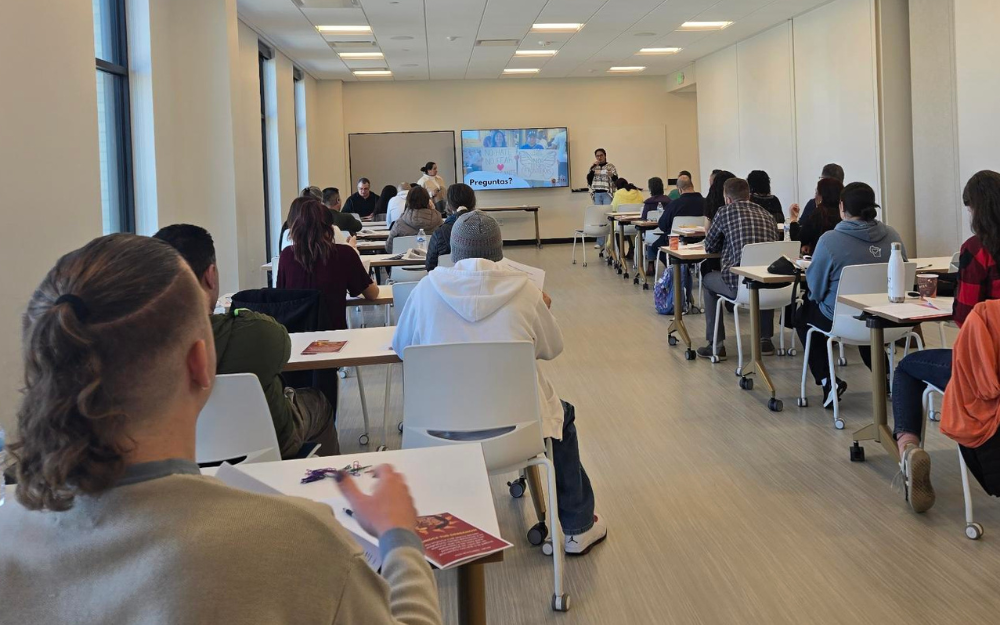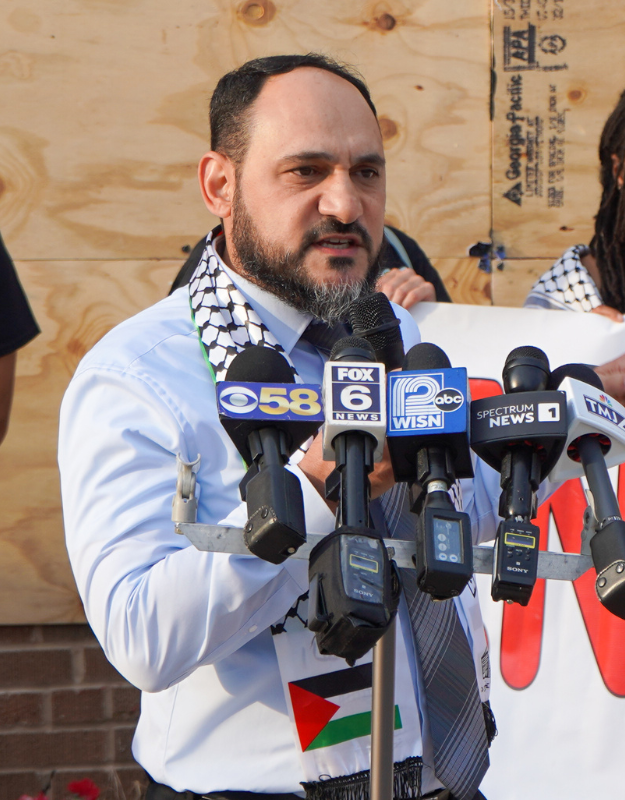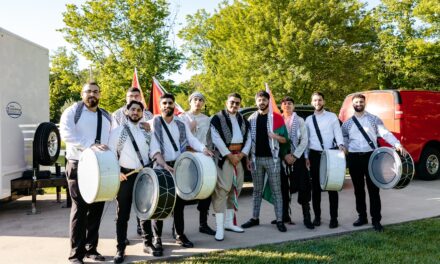
There are several trainings around the Milwaukee area on immigrant and voting rights, driver’s licenses, and more—plus citizenship classes, legal aid and DACA resources.
President Trump has authorized U.S. Immigration and Customs Enforcement (ICE) to carry out nationwide raids aimed at detaining and deporting undocumented immigrants, aligning with enforcement priorities outlined in his campaign. Nearly three months into Trump’s second term, Wisconsin has already seen ICE activity at Milwaukee Public Schools and the Milwaukee County Courthouse.
While arguments can be made about the cruel, immoral and xenophobic implications of these operations, communities across the nation are forced to contend with the issue at hand. Thus, people must understand their constitutional rights if they are caught in the middle of such a situation.
Milwaukee Turners Executive Director, Emilio De Torre notes that when it comes to ICE and deportations, the focus is on a small subsection of immigrants like Deferred Action for Childhood Arrivals (DACA) students or people under Deferred Action for Labor Enforcement. In reality, these issues also impact folks like transnational adoptees and victims of human trafficking who are working with law enforcement.

Photo by Rob Randolf
Emilio De Torre, executive director of Milwaukee Turners at Turner Hall
“The threshold for being deportable is much greater for a non-citizen than for a citizen,” De Torre confirms. “Trump and the federal government are pretending that they’re deporting organized crime, drug gangs and human traffickers when in reality it’s terrorizing civilians who are working, going to school, and trying to get their piece of the American Dream.”
He adds, “I’m already getting phone calls from MATC that students aren’t showing up. I’m getting phone calls from public schools saying that parents are concerned about picking up their kids. There’s so much misinformation, and people erroneously assume that these folks are somehow bad actors when they’re not, and it’s a gross disruption of our community.”
Having safety plans with family and loved ones is crucial in any event that someone is detained by ICE. Trusted folks should know where someone’s important documents are kept, like previous immigration filings, birth and marriage certificates, and passports.
Particularly when children are involved, there must be an emergency contact list encompassing schools, caregivers, and power of attorney. Establishing bail funds for detainees is most helpful as well.
According to Milwaukee-based attorney Munjed Ahmad, one of the biggest misconceptions about ICE is that they only go after people who do not have legal status in the U.S. and that those who have lawful permanent resident status are not targeted.
“That’s absolutely not true,” he states. “ICE does conduct operations to arrest people who have overstayed visas or have committed what they deem to be crimes.”

Ahmad has handled a few cases where someone had been given a non-criminal ticket or citation, but ICE still targeted them. “From their perspective, they see it as a criminal offense, even if they had a valid work visa,” he explains.
Even if an individual with a green card leaves the U.S. for a short amount of time and then tries to re-enter, Customs & Border Protection (CBP) agents may deny them entry if they have a criminal record.

Photo by Kamal Moon
Attorney Munjed Ahmed makes clear that ICE also targets citizens who have lawful, permanent resident status.
Another common misconception, Ahmad says, is that ICE can only detain someone for extended periods if that person has been convicted of a crime.
“Particularly in the past Trump administration and the years after the 9/11 attacks, ICE has used the label ‘security concern’ for certain Muslims that causes them to be held even if they had no real evidence,” he mentions.
ICE cannot be stopped from entering public spaces. They cannot, however, legally arrest anyone at any time, nor can they legally enter private property at any time. For ICE to do so, they must have a federal warrant signed by a federal judge, which requires one to open the door.
Federal warrants are different from administrative warrants, which are signed by ICE officers or immigration judges and are comparatively limited in scope. Administrative warrants do not require one to open the door and allow ICE into private spaces.
Therefore, it is paramount for designated private spaces to be identified in the event of an ICE raid. Those could be the administrative offices of a place of worship or the classrooms in a school.
A final misconception Ahmad points out is that individuals arrested by ICE get deported immediately. “It doesn’t mean that you lose your due process rights,” he elaborates. “Unless there is a previous deportation order or something like that, you are still able to go to immigration court and fight your case.”
In any case, one has the right to remain silent, to an attorney, and to language services.
Christine Neumann-Ortiz, executive director of Voces de la Frontera (VDLF), describes how ICE may use manipulative or intimidating tactics to get people to comply with them.
“ICE has tricked people into signing voluntary departures by telling them that it will help them with legal assistance, or by telling them that they’re never going to see their family again. You can’t lie to ICE, but they can lie to you.”
Ahmad touches on how federal authorities have been surveilling and profiling Muslim communities since 9/11, subjecting those suspected of illegal activities to family separations, detentions, and deportations.

Photo by Adam Ryan Morris
Christine Neumann-Ortiz, executive director, Voces de la Frontera describes the manipulative tactics ICE has used to get people to comply with them.
“In the first Trump administration, when people were being arrested by ICE, instead of just getting their bio data and starting the deportation proceedings, they would be asked questions such as if they have information about anyone who’s doing something from specific Middle Eastern countries that may pose a threat to the United States.”
ICE effectively uses the threat of deportation as a means of eliciting information about others in the community.
“They’ll make promises where if someone tells them information, they may be able to help them avoid deportation,” Ahmad continues. “There has been trouble getting halal foods and discrimination in regards to prayers and breaking fast during Ramadan in these ICE facilities.”
The Trump administration’s crackdowns on campus and community-based protests against the genocide in Palestine, combined with its proposal for implementation of a second Muslim travel ban, is a testament to how Trump’s second term is stoking a fear-based sociopolitical climate in increasingly harrowing ways.
“There’s been attacks and threats on the right to organize,” Neumann-Ortiz notes. “What is different this time around is that there’s a real intentionality where it’s not just attacks on groups of people but also individuals and organizations.”
Islamophobic protocols and fear mongering rhetoric have had egregious ramifications, like Muslims being put on watchlists or no-fly lists when there is no evidence of any nefarious activities.
Ahmad attests, “I have many clients who have gone to airports recently and actually missed their flights, even when they got there three hours earlier, because their name has been associated with being a possible suspected security concern with no evidence, because their name might be similar to somebody overseas with ties to something.”
VDLF and the Milwaukee Turners have both been facilitating Know Your Rights in-person training offerings to help community members be aware of and prepared for situations involving ICE operations.
In addition to holding trainings on immigrant rights, voting rights, and acquiring driver’s licenses several times a year, VDLF is available to bring such trainings to cities across Wisconsin. There are citizenship classes, legal services, and DACA resources they offer as well.
VDLF has also been working diligently to uphold and defend sanctuary policies that recognize the constitutional rights of immigrants, protecting them in spaces like schools, hospitals, and places of worship.
“That’s the standard in Milwaukee that has been won as fruit of the movement’s struggle,” Neumann-Ortiz affirms. “We’re encouraging other schools, cities, and counties to implement these protocols, and they can be extended to workplaces with drills as well.”
The Milwaukee Turners have a weekly Know Your Rights training in addition to an immigration training that not only dispels racist economic myths about U.S. immigrants but also connects immigrants, refugees, and undocumented people with proper legal forms to renew or apply for status.
They are also working with local schools, community centers, restaurants, and businesses on policy implementations.
“There’s a huge demand for this where we can’t even keep up with all the asks, whether it’s an individual or a collective ask,” De Torre observes. “There’s a lot of multigenerational folks who have been asking for this because they want to protect their neighbors.”
Ahmad concludes, “There are times where you must cooperate – that’s true – but you don’t always have to, and there are instances where you can defend these safe spaces, and we have to be able to do that and advocate for our rights, even when it comes with a lot of hard work.”













